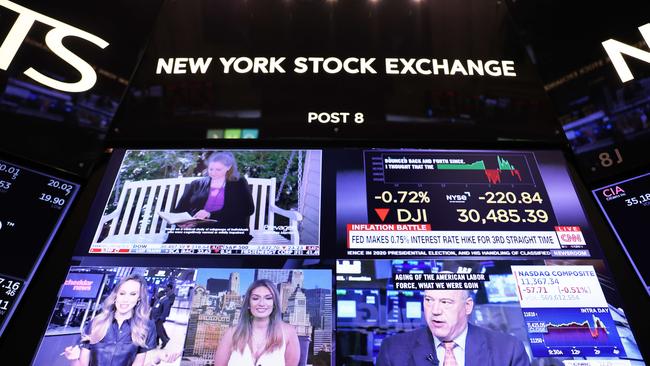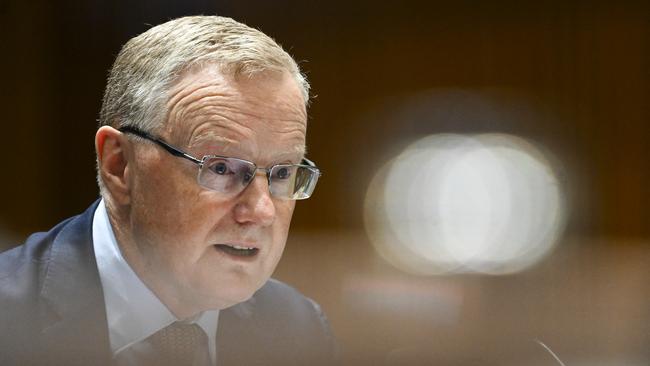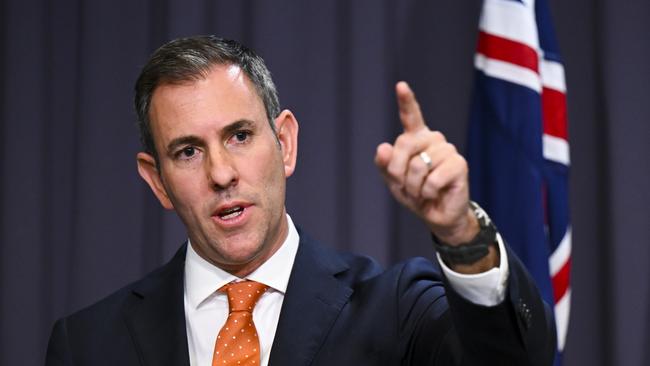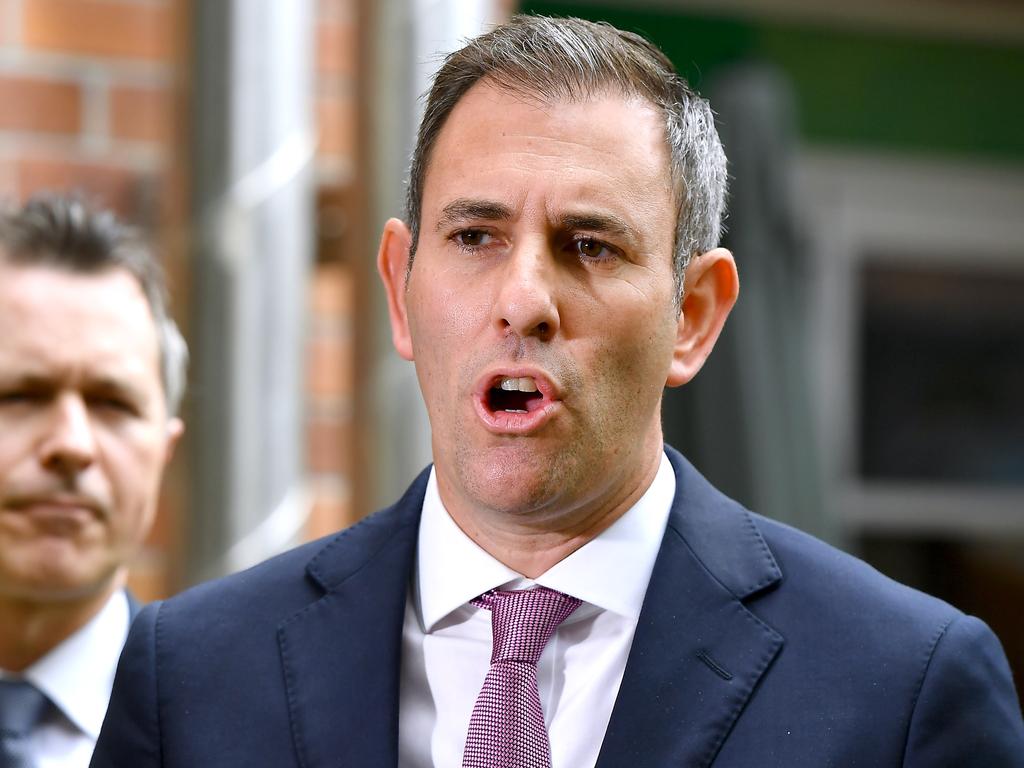The Fed’s brutal war on inflation risks recession
Jim Chalmers and Philip Lowe confront rising debt, rampant inflation and a global slowdown.

The Albanese government and Reserve Bank are at the mercy of global turbulence, their immediate game plans clouded by doubts and the menace of recession.
Jim Chalmers sees trouble brewing and new pressures on spending as he prepares Labor’s first budget in a month’s time. “Inflation is rampant, central banks are responding with blunt and brutal rate rises, and growth is slowing,” the Treasurer wrote in our pages on Friday.
“The economies of the United States and the United Kingdom are in reverse; China’s has slowed markedly; and the war in Ukraine sparked an energy crisis which shows no signs of abating.”
RBA deputy governor Michele Bullock warns the “outlook for the world economy is looking quite uncertain and quite worrying”. “That obviously has implications for us because of the tendency to flow through to commodity prices,” Bullock told a Bloomberg event on Wednesday. “It’s very uncertain and on a bit of a knife edge.”
The third consecutive 0.75 percentage point interest-rate hike by the US Federal Reserve signals the march of “the mighty hawks”, according to one bank analyst, an unintended echo of other turmoil on our shores. America’s total war on inflation recalls the pitiless approach four decades ago of former Fed chairman Paul Volcker: whatever it takes.
According to The Wall Street Journal’s Nick Timiraos, in his bellicose speech last month to central bankers at Jackson Hole, Fed chairman Jerome Powell invoked Volcker’s punishing rate increases to snuff out double-digit inflation, pushing the US economy into recession in the early 1980s. “We must keep at it until the job is done,” Powell said, invoking the title of his predecessor’s 2018 autobiography, Keeping At It.

“The moment underscores the Fed chairman’s rapid about-face during one of the most tumultuous periods for the economy and central bank since the 1970s,” Timiraos wrote this week ahead of the Fed’s two-day open market committee meeting.
“After championing an aggressive stimulus campaign just 12 months ago, he has this year led the most rapid tightening of monetary policy since the early 1980s.”
RBA governor Philip Lowe is also speaking loudly, frequently, and carrying a blunt stick. In our case, five rapid monetary turns, taking the official cash rate target from 0.1 per cent at the start of May to the current 2.35 per cent.
It’s a whiplash affair here as well, given Lowe’s “forward guidance” as late as November was that it was “plausible” the RBA’s first cash-rate rise would not occur before 2024.
“Some people think that was a mistake, and it may well have been, but what we were trying to do there was to send a very strong message to the community that the Reserve Bank would do what was necessary to keep the economy as strong as it could be,” Lowe told a parliamentary committee a week ago.
“It was scary. It was a difficult time, and we wanted to use every instrument in our toolkit to provide support for the country.”
Now that toolkit, which is really just one clunky weapon and tough talk, is being used to fight the “scourge” of inflation.
Lowe is trying to massage inflation psychology in this country, given that businesses are less inhibited about raising their prices and consumers seem willing to accept them – up to a point.
Lowe insists we don’t have the wage pressures prevalent in the US and Britain, which will bring “trouble” he doesn’t want to see here. But inflation is expected to rise to almost 8 per cent by the end of the year, and then find its way close to the top of 2-3 per cent home base by the end of 2024. “It will be difficult for Australia to stay on that narrow path to a soft landing if there is further material bad news on the global economy,” he told the House of Representatives economics committee.
The Fed’s move to a funds rate range of 3-3.25 per cent, as well as strong signals of further hikes this year, broadens the interest-rate differential between the US and Australia. Our dollar has already experienced a hefty depreciation against the greenback, with market analysts seeing the $A at US62-63c by the end of the year.
That will make imports more expensive, pushing consumer inflation higher, which means the RBA will have to tighten policy more than it would otherwise. With global rates rising, Westpac chief economist Bill Evans has adjusted up his call on the RBA’s terminal cash rate to 3.6 per cent, with a 50 basis point rise in October, and 25 basis points in November, December and February (there is no meeting in January).
Evans says some may see that as “over-tightening”, but he thinks that’s necessary to wring inflation out of the system. He believes the RBA will go on hold in March on evidence growth here is slowing and US inflation and rates have also peaked.
“Given these extreme circumstances around the build-up of inflationary pressures, central banks will take the policy of ‘least regret’, which will be to err on the side of containing inflation at the potential cost of growth in the near term,” Evans wrote in an economic note.
Lowe has said there will be blood in the war on inflation: weaker growth, declines in workers’ purchasing power and a rise in unemployment. All of these things, he argues, are necessary to keep a greater evil at bay.

Some economists see the possibility of a negative GDP quarter next year, and the need for the RBA to ease policy. In any case, next year is going to be a slog for the economy, perhaps annual growth of around 1.5 per cent or less – about half the pace of the current year.
Chalmers insists he won’t be making the RBA’s job harder by spending more, and stoking demand, in the October 25 statement. The $50bn windfall in the final budget outcome for last financial year, due to the export-price surge and robust employment, has predictably animated the big spenders and fiscal fantasists.
The Treasurer appears to be holding the line on providing extra cost-of-living relief, beyond measures on childcare, medicines and aged care promised during the campaign. He’s looking ahead to the next few budgets, where fiscal repair begins in earnest.
That’s not Labor’s natural terrain, so Chalmers will be kicking against the instincts of his party, cabinet colleagues and, of course, Anthony Albanese. The Prime Minister’s vision is for an “opportunity” uplift just as scarcity rears its ugly head.
The world is closing in, and while the Coalition bears responsibility for its polyphonic actions and inactions over almost a decade, Labor has full possession of the estate. The revenue bonanza will dry up. Consumer confidence is at miserable levels and the mortgage belt’s pain is going to get worse.
Home prices have a way to fall, with the heaviest losses in conservative and teal heartlands. Likewise, the tumble in value in other asset classes, most notably equities, will hit the retirement savings of those sweating and faltering in step on the home stretch of accumulation.
Like them or not, Chalmers and Lowe, grim today but determinedly sunny tomorrow, are our fiscal and monetary stewards through this period of peril. It would be more comforting in a way to call them masters but that would be overstating their grip on our future.







The world is a dangerous place, a pit of hawks, despots and speculators, and the odds of Australia avoiding economic harm are lengthening.